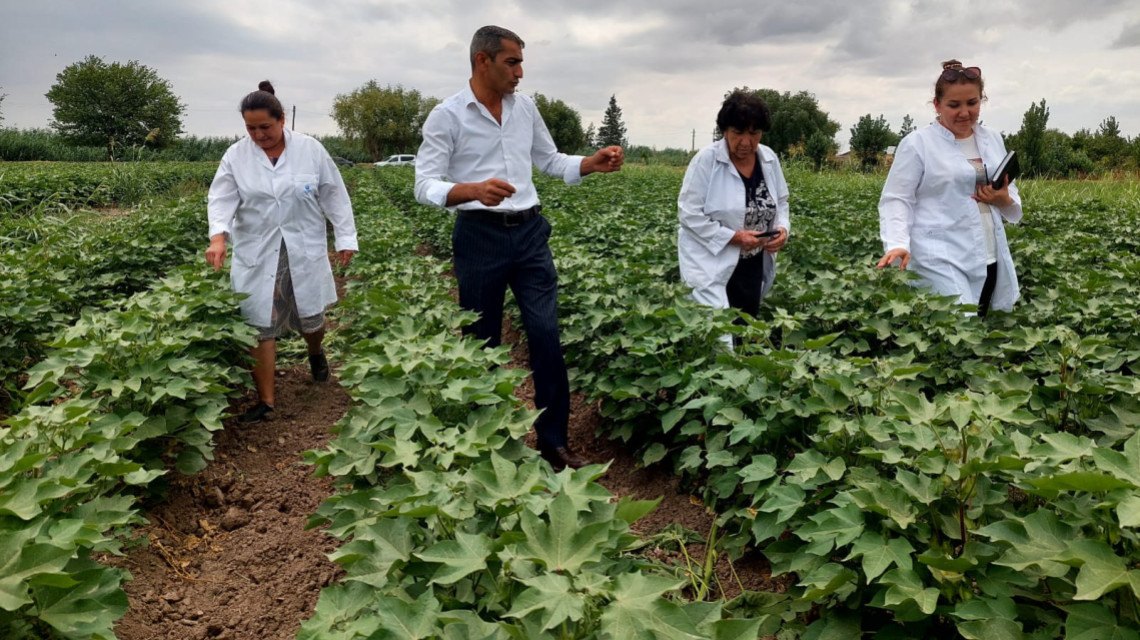
Isotopic techniques help Azerbaijani researchers and farmers to obtain key information on how to optimize fertilizer use and increase the efficiency of cotton production while maintaining soil health. (Photo: M. Zaman/IAEA)
In countries like Azerbaijan, Burkina Faso and Pakistan, millions of farmers rely on cotton for a living, but the crop is highly vulnerable to climate conditions. In recent years, Azerbaijan and Pakistan have collaborated with the IAEA and FAO to use nuclear techniques to develop new cotton varieties that are more resilient and better adapted to the new climate reality.
“In partnership with IAEA, we have to create new seeds which are more resilient to drought, to heatwaves, and that are still able to produce enough cotton per hectare, enabling our farmers to earn a decent livelihood,” said Atiqur Rehman, Pakistan’s Parliamentary Secretary of the Ministry of Climate Change and Environmental Coordination.
“One significant advancement in Azerbaijan’s cotton production has been made in collaboration with the IAEA, which brought the application of nuclear technologies to produce more resilient cotton varieties,” said Sarvan Jafarov, Deputy Minister of Agriculture of Azerbaijan.
In Burkina Faso, cotton is a vital cash crop. Along with Benin, Chad, Cote d’Ivoire and Mali, Burkina Faso is one of the leading cotton producers in West Africa; these countries are known as the Cotton Four Plus or C4+ countries. However, the cotton sector faces many challenges, one of which is climate change.
“Nuclear technology can help us make our crops more resilient and our soil and water resources better managed,” said Amadou Dicko, Burkina Faso’s Deputy Minister of Agriculture. “The C4+ Cotton Partnership helps us strengthen smallholder farmers’ capacities through training and access to adapted seeds,” he added.
Within the cotton-to-clothing value chain, the industrial segment, particularly the production of textiles and garments, is responsible for the largest share of CO2 emissions. UNIDO’s strategy in response to climate change is to maximize synergies with other priority areas, such as energy, agribusiness development and biodiversity, as well as synergies with various partners. The WTO’s role lies in shaping global trade policies, which are crucial for supporting the whole cotton value chain.
"We have a great opportunity here to support the main cotton producing countries in Africa and to build win-win partnerships," said Ciyong Zou, UNIDO Deputy Director General and Managing Director of the Directorate of Technical Cooperation and Sustainable Industrial Development. “In Africa, a new model of production and trade in textiles and garments can emerge – a model in which industry adds value to local resources, with shorter supply chains, where industry creates decent jobs and produces in a climate friendly and environmentally sound manner.”
An innovative partnership unveiled in February 2024 brings together multiple stakeholders—including the IAEA, FIFA, the WTO and UNIDO—aims to support the West African C4+ countries. Enabling the sustainable development of the cotton sector in these countries and its integration into international textile value chains promises to yield significant results in socioeconomic growth. This strategy can help to create jobs, empower women and young people and enhance the environmental sustainability of cotton farming and processing—ultimately improving the living standards of millions of people.
“We are doing win-win-win – winning at the production level having climate smart agriculture, at the transformation level that also creates jobs, and at the export level having smart trade procedures with less emissions,” said WTO Director General Ngozi Okonjo-Iweala.
Discussions also highlighted the role of the private sector and financing institutions. The International Islamic Trade Finance Corporation (ITFC), a global trade finance and development institution, has been a financier of cotton in West and Central Africa. “The focus should be on enhancing support through research for providing climate resilient seeds, as well as capacity building to adopt best practices in climate mitigation in the areas that are rain fed and consequently impacted by climate change,” said Nazeem Noordali, ITFC Chief Operating Officer.






